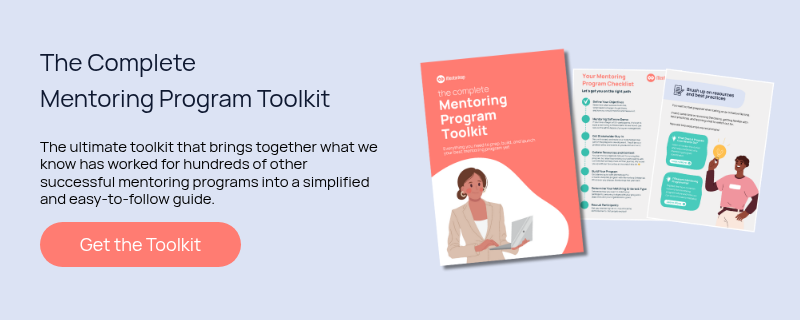At least 71% of Fortune 500 companies run formal mentoring programs.
So there must be something beneficial about them right? Absolutely.
There are a lot of benefits to mentoring programs; benefits for the mentees; benefits for the organisations; benefits for the mentors; and a bunch of benefits for society too. So here is your list of 40 mentoring program benefits (& not an exhaustive list) that you definitely don’t want to miss out on.
Mentoring Benefits for Mentees
1. New development opportunities
Who doesn't want another channel to better themselves?
Mentoring can provide a mentee with new development opportunities by offering guidance and support in areas such as skill development, career advancement, and personal growth. A mentor can share their knowledge, experience, and insights, and provide feedback and advice on the mentee’s performance. They can also serve as a role model, helping the mentee to set goals and develop the skills and confidence needed to achieve them. Additionally, mentoring can provide access to networking opportunities and other resources that can help the mentee grow and succeed in their career.
2. Increased confidence
We all need someone who can encourage us to do that thing we might otherwise not.
Mentoring is like having a personal confidence coach, helping you build the self-assurance you need to achieve your goals. Your mentor will be there to provide you with support, guidance and honest feedback. Together, you’ll identify your strengths and areas for improvement, set goals, and figure out how to achieve them. This process will not only help you develop new skills and knowledge but also help you feel more in control of your own growth. And let’s not forget, as your mentor, they’ll be a shining example of how to approach challenges and opportunities with confidence. By observing them, you’ll learn how to adopt the same confidence-building techniques and mindset. Plus, through the mentoring process, you’ll receive validation and recognition for your accomplishments, which will give your self-worth and confidence a boost.
3. A larger network
It's not what you know, it's who you know, right?
Mentoring is like having a personal connection specialist by your side, helping you grow your professional network. Your mentor likely has a wealth of established relationships and connections in their field, which they’re more than happy to share with you. They can introduce you to other professionals and experts in your field, and open doors for you to attend networking events and connect with potential employers, collaborators, and business partners.
4. A more valuable network
Mentors are trusted confidants. And they will go to bat for you if you show them why they should.
And it’s not just about the number of connections, your mentor will also help you develop the skills and confidence you need to make the most of networking opportunities and build your own network. Through the mentoring relationship, you’ll learn how to network like a pro, and who knows, you might even end up with some new friends in your field. And the cherry on top, mentoring can open doors to new opportunities, and since mentors are usually successful people in their field, their networks are usually diverse, and they may connect you with people you wouldn’t have had access to otherwise.
5. Accountability
Have a 'goal' that you never really pursue? Having a mentor there to ask how that goal is progressing makes all the difference to your motivation (or fear).
Having a mentoring partner to help you stay on track and achieve your goals is both incredibly valuable and a privilege. Your mentor can guide you, support you, and hold you accountable – and help you set realistic goals, create a plan of action, and provide regular check-ins to ensure progress. They also may offer feedback, advice, and resources to help you overcome obstacles, stay motivated and focus on your goals. A good mentoring relationship can often help you stay committed to your objectives, and ultimately lead to success.
6. Real-life advice
Sure Google can answer most of your objective questions, but Google hasn't been there.
Real-life advice is often more valuable than advice you read in books or online because it’s tailored to your specific situation. It’s given by people who have personal experience and knowledge and can offer practical solutions and strategies that are specific to you. Plus, real-life advice comes with emotional support and encouragement, which can be super helpful for motivation and accountability.
Here are 5 reasons mentoring will always be better than Google
7. Human connection
We could all do with a bit more real interaction.
Participating in a mentoring program can have a positive impact on human connection by fostering a sense of trust and openness between the mentor and mentee. Through regular interactions, mentees can develop a deeper understanding of their mentor’s experiences, perspectives, and values. Often this has a flow-on effect, leading to more meaningful relationships and increased mutual respect.
8. Applicable advice
Who is the best person to tell you about how to become a VP of Sales?
Probably that VP of Sales.
Mentoring differs from other forms of advice in terms of relevance because it is tailored to the specific needs and goals of the mentee. By pairing a mentor with a similar career trajectory or set of interests, they can work closely to best understand their unique situation and provide advice and guidance based on that understanding. This can make the advice more relevant and applicable to the mentee’s specific circumstances, which can increase the chances of success.
9. Improve communication skills
Communication skills can always be improved through.. communication. Especially with people of different backgrounds and expertise.
Mentoring can help you communicate better with people who are different to you by giving you opportunities to interact with diverse individuals and learn from them. Your mentor can provide you with feedback on your communication style, offer strategies for effective communication, and help you understand and respect different perspectives. Plus, mentoring provides a safe and supportive environment for you to practice and improve your communication skills. All in all, mentoring can help you navigate and communicate better with people from different backgrounds, making you more versatile and effective in your communication.
10. Improve leadership skills
If your mentor is more senior than you, you can learn a thing or two about what it takes to be a leader.
A mentor can help you level up your leadership skills by providing guidance, support, and feedback on your abilities. They’ll help you identify your strengths and areas for improvement, set goals, and develop the skills you need to lead effectively. Your mentor can also serve as a role model , showing you how to lead with integrity and authenticity. Plus, they can provide access to their professional network and opportunities for you to gain practical experience and improve your leadership skills. And not to mention, they can also offer feedback and coaching on different leadership styles, helping you find the best fit for you.
11. Improve management skills
Learn how to manage professional relationships. That's what managers do.
Having a mentor can help you become a pro at managing things. They’ll provide guidance and support in areas like goal-setting, decision-making, and problem-solving. They’ll give you honest feedback on your performance and help you identify your strengths and areas for improvement. They’ll also show you how to effectively lead and manage a team and navigate challenges. Plus, they’ll serve as a role model for good management and give you opportunities to gain practical experience. And let’s not forget, they’ll also offer feedback and coaching on different management styles, helping you find the best fit for you. Overall, a mentor can be a real asset in helping you develop your management skills.
12. Personal development
Great mentoring = great progress.
Having a mentor can help you make major strides in your personal progress. By providing guidance, support, and feedback on your personal goals and development they can help you identify your strengths and areas for improvement, set goals, and develop the skills you need to achieve them. They’ll also show you how to navigate personal challenges and make decisions. Plus, they serve as a role model for personal growth and give you access to resources and opportunities to help you succeed.
13. Career development
Employees who receive mentoring are promoted more often.
5 times more often, even! In addition to all of the above benefits, mentors can often offer feedback and coaching on different career development styles and strategies, which can help the mentee to discover the career path that best fits them and increase their chances of being promoted. Sometimes discovering the right path for one’s skillset and strengths can be uncovered by working with a mentor.
14. Find a connection
In company mentoring programs, having a mentor can better connect a mentee to management - and the organisation itself.
Participating in mentoring can make you feel more connected to an organisation because it provides opportunities to interact with and learn from experienced individuals within the company. Furthermore, mentoring often includes networking opportunities, which can expand your professional and personal connections within the organization, making you feel more connected to the organization. Overall, mentoring can create a sense of belonging and increase your engagement with the organization.
15. Empowerment
Every employee should feel like they can control their career and destiny. Mentoring can do that.
Mentors can help you identify your strengths and areas for improvement, set goals, and develop the necessary skills to achieve them – they can also help you check for your career blind spots. They can also provide insights and advice on how to navigate challenges and make decisions about your career trajectory and help you to feel more capable and in control of your own development and destiny.
Mentoring Benefits for Mentors
16. Give back or pay it forward
People enjoy giving back and having an impact on other people's lives.
Mentors derive immense enjoyment from the act of giving back and having a profound impact on other people’s lives. The opportunity to share knowledge, experiences, and wisdom with mentees is not only fulfilling but also deeply gratifying. Witnessing mentees grow, overcome challenges, and achieve their goals, knowing that their guidance played a crucial role, is a source of great joy. It’s a reminder that their efforts are making a positive difference in the world and that they are leaving a lasting legacy by helping others succeed. This sense of purpose and the knowledge that they are contributing to someone else’s growth and development is what makes mentoring a truly rewarding and enjoyable experience for mentors.
17. Reverse mentoring
Think mentors have learned it all? Think again. Reverse mentoring is becoming increasingly popular in a quickly evolving world.
Mentoring is equally enjoyable for mentors who engage in reverse mentoring, where they learn from their younger or less experienced mentees. In this unique dynamic, mentors have the opportunity to gain fresh perspectives, insights, and knowledge from a new generation, often in areas such as technology, current trends, and evolving social norms. This mentorship is a two-way street, fostering a sense of shared learning and growth.
This not only keeps mentors intellectually and culturally engaged but also offers a chance to adapt and stay relevant in a rapidly changing world. The joy in reverse mentoring lies in the mutual exchange of ideas and experiences, where both parties benefit, and mentors, in particular, relish the chance to expand their horizons and bridge generational gaps while making a meaningful impact on their mentees.
18. Enjoying the experience
We asked some of Australia’s best mentors what was in it for them – and 50% said they simply enjoyed mentoring.
Mentors find the practice of mentoring enjoyable and, indeed, fun for several reasons. Firstly, mentoring provides a platform to share their knowledge and expertise, which can be a deeply satisfying and rewarding experience. It allows mentors to witness the growth and development of their mentees, offering a sense of accomplishment and pride. Moreover, the act of mentoring often involves engaging discussions, problem-solving, and the exchange of ideas, making it intellectually stimulating and enjoyable. The mentor-mentee relationship is a two-way street where mentors also learn from the fresh perspectives and experiences of their mentees, contributing to their own personal and professional growth.
19. Access to a talent pipeline
What better way to find the next rising star than to help raise them up?
One of the often overlooked yet invaluable benefits of mentoring for mentors is the access to a talent pipeline. By actively engaging with mentees, mentors have the opportunity to identify and nurture emerging talent. This pipeline can serve as a direct channel for discovering and cultivating potential future leaders, employees, or collaborators. Mentors can assess the skills, abilities, and potential of their mentees, helping them align with their own organization’s needs or fostering relationships that lead to partnerships and collaborations. In this way, mentoring not only provides personal fulfilment and professional growth but also offers mentors a strategic advantage by ensuring a steady flow of capable individuals into their network or organization, creating a win-win scenario for both mentors and their mentees.
20. Keep your finger on the pulse
Your mentees know all about today's consumers. And know all about the latest in technology, fashion etc.
Mentoring offers mentors the invaluable benefit of keeping their finger on the pulse of their industry or field, or even just society as a whole. It provides a window into emerging trends, evolving practices, and fresh perspectives, all of which are vital for staying current and relevant. By engaging with mentees, mentors gain exposure to the latest ideas and innovations, often driven by younger generations or those with different experiences. This insight is not only intellectually stimulating but also strategically advantageous, as it equips mentors with the knowledge and adaptability needed to navigate a rapidly changing landscape. In essence, mentoring becomes a dynamic learning experience, ensuring that mentors continue to evolve, grow, and remain at the forefront of their profession, all while making a meaningful impact on their mentees’ development.
21. Ego boost
Nothing says 'I'm valuable' more than someone leaning on your advice.
Mentoring can be a powerful ego boost for mentors. It’s a tangible reminder that their expertise, knowledge, and insights are not only valued but sought after by others. Nothing quite says “I’m valuable” more than someone leaning on your advice and guidance for their personal and professional development. This affirmation of their competence and the trust placed in their mentorship can provide a significant boost to mentors’ self-esteem and self-worth. It’s a gratifying feeling to know that your experience and wisdom have a direct, positive impact on someone else’s journey, making mentors feel valued, respected, and, in many ways, indispensable in the lives of their mentees.
22. Improve management skills
What better way to learn management skills than to manage without all of the typical management attachments?
By guiding and supporting mentees, mentors develop and refine their abilities in leadership, communication, problem-solving, and decision-making. They learn to adapt their approach to meet the specific needs and personalities of their mentees, honing their management style in the process. Furthermore, mentors often find themselves in the role of motivator, helping mentees set and achieve their goals. This not only sharpens their coaching and motivational skills but also provides insights into effective management techniques. In essence, mentoring becomes a hands-on laboratory for mentors to fine-tune their management capabilities, ultimately making them more effective and influential leaders in their workplaces and communities.
23. Bridge the generational divide
For the first time in history, four different generations are working together. And while they're all different, they aren't so different that it can't work.
Mentoring offers mentors a unique opportunity to bridge the generational divide, fostering mutual understanding and collaboration between different age groups. Mentors can gain valuable insights into the perspectives, expectations, and aspirations of a different generation. Simultaneously, mentors can share their wealth of experience, knowledge, and wisdom, helping to provide context and historical understanding. This exchange of ideas and experiences helps break down generational barriers and fosters a more inclusive and harmonious working environment. Mentors and mentees often discover common ground and shared goals, resulting in productive partnerships that benefit both parties. Thus, mentoring becomes a powerful tool for not only transferring knowledge but also for building bridges across generations, enriching the mentor’s worldview and expanding their ability to connect with diverse individuals in the workplace and beyond.
24. Become an even more valuable asset
Sure, your work and experience are good. But imagine how valuable you could be by multiplying that impact by making others great too.
By sharing their expertise and knowledge, mentors not only enrich the lives of their mentees but also position themselves as indispensable resources within their networks and organizations. This act of giving back demonstrates their commitment to nurturing talent and contributing to the growth of others, which can boost their reputation and credibility. In turn, they often find themselves entrusted with more responsibilities and leadership roles, becoming go-to experts in their respective fields. Moreover, the process of mentoring can further hone their leadership, communication, and interpersonal skills, making them more effective and influential in their roles. In essence, mentoring becomes a catalyst for mentors to solidify their status as invaluable assets, both in the eyes of their peers and within their organizations.
25. Increase knowledge share
The more value we share, the more value we create.
As mentors guide and support their mentees, they are not just imparting knowledge but also actively engaging in a reciprocal exchange of ideas, experiences, and insights. This process often prompts mentors to revisit and reevaluate their own understanding, encouraging continuous learning and personal growth. The act of teaching and explaining concepts to their mentees reinforces their own knowledge and, in some cases, uncovers new perspectives or innovative approaches to familiar problems. In addition, mentors often gain fresh insights into emerging trends and technologies from their mentees, who may be more attuned to the latest developments. The result is a dynamic, bi-directional knowledge flow that enriches the mentor’s understanding, keeps them intellectually engaged, and ensures they stay at the cutting edge of their field.
26. Improve interpersonal skills
Learn to be a better listener. Learn how to give great advice.
As they guide and support their mentees, mentors become adept at active listening, effective communication, and empathetic understanding. They learn to tailor their guidance to the unique needs and personalities of their mentees, fostering more meaningful and constructive interactions. Mentors often find themselves in the role of motivator, helping mentees set and achieve goals. This sharpens their ability to encourage and inspire others, a valuable skill in both personal and professional relationships. The mentoring process also encourages mentors to be open to feedback and adapt their communication style, further honing their interpersonal skills. In essence, mentoring becomes a practical training ground for mentors to become more effective communicators and relationship builders, ultimately enriching both their personal and professional lives.
Learn more: The Benefits of Mentoring for the Mentors
Mentoring Program Benefits for Organisations
27. Your people want mentoring
And it's beneficial for you to meet that demand
Employees actively seek mentoring opportunities. In today’s competitive job market, employees, especially younger generations, are increasingly drawn to organizations that offer mentoring programs. Mentoring signals a commitment to employee development and growth, fostering a sense of support and engagement. It can significantly enhance employee retention and satisfaction, as individuals feel valued and invested in. Furthermore, mentoring programs align with a growing desire for continuous learning and skill development, which is vital in an ever-evolving business landscape. Therefore, organizations that recognize their employees’ hunger for mentoring not only attract top talent but also ensure a motivated and skilled workforce that contributes to the company’s success and innovation.
Award-winning program coordinator Kate Lloyd talks about why it was important to formalize how mentoring happened at nib Group.
Access the full fireside chat with nib’s mentoring program coordinators here:
28. Leadership development and productivity
Everyone is more productive when mentoring is in the L&D strategy
Managerial productivity increases by 88% when mentoring is involved, versus only 24% with training alone. Mentoring programs are a powerful way for organizations to make their leaders better and more productive because it allows organizations to enable their leaders to continuously refine their leadership skills. This leads to more effective decision-making, enhanced problem-solving abilities, and improved communication. As leaders engage in mentorship, they not only gain insights from their mentors but also gain a fresh perspective on their own leadership styles, often becoming more adaptable and agile in their roles. This, in turn, results in more efficient, motivated, and productive leaders who can drive the organization’s success.
29. Retention
You're more likely to keep the people you give mentoring opportunities to
Retention rates have been much higher for mentees and mentors (72% and 69%) than for employees not involved in mentoring programs (49%).
Mentoring not only provides employees with a sense of professional development and growth within the company but also fosters a sense of belonging and loyalty. Employees who have mentors are more likely to feel valued, engaged, and committed to their organization, reducing turnover rates. Moreover, as mentees gain new skills and experiences through mentorship, they become valuable assets to the organization, often filling critical roles from within. By investing in mentoring programs, organizations can ultimately save on recruitment and onboarding costs while retaining their top talent.
Read More: Using Mentoring As A Critical Retention Tool
30. Recruitment
Top talent want to work in organizations that will give them mentoring opportunities
More than 60% of college and graduate students listed mentoring as a criterion for selecting an employer after graduation.
Having mentoring programs in place demonstrates a commitment to employee growth and development, making the company an attractive prospect for potential hires. The opportunity to have a mentor can be a strong selling point for job seekers, as it signals that the organization invests in its employees’ professional advancement. Moreover, effective mentorship programs often lead to greater job satisfaction, making current employees into brand ambassadors who speak positively about the organization to potential recruits. By showcasing these mentorship opportunities, organizations not only attract top talent but also foster a more vibrant and dynamic workforce, which can be a significant competitive advantage in recruitment.
Read More: Using Mentoring Programs to Attract Top Talent; How Mentoring Programs Can Help You Secure Top Talent
31. Improve culture
What better way to improve your culture than to connect those within it?
By running mentorship programs, organizations emphasize collaboration, knowledge sharing, and a commitment to employee growth. These values become embedded in the company’s culture, creating a supportive and inclusive environment. Mentorship encourages open communication, mentor-mentee relationships based on trust and respect, and a strong sense of camaraderie among employees. As these positive interactions and values become the norm, the overall culture becomes more engaging, motivating, and conducive to productivity. Employees are more likely to feel connected to the organization’s mission and each other, leading to a positive culture that not only attracts and retains top talent but also bolsters employee satisfaction and performance.
Read More: Addressing Problem Areas In Your Organization’s Culture
32. Develop and foster culture
Have your most senior advocates pass down their passion and vision to more junior employees to ensure that the great culture you've built stays strong.
Through mentorship programs, experienced mentors instill the company’s core values and mission into the next generation of leaders. This process aligns individuals with the organization’s overarching goals and fosters a strong sense of identity and purpose. As these values are passed on, a cohesive culture that resonates with the company’s vision is cultivated. This ensures that the organization’s legacy and mission endure and evolve, while employees become invested in the company’s long-term success, reinforcing a culture that is both enduring and adaptable to change.
Read More: Addressing Problem Areas In Your Organization’s Culture
33. Increase knowledge share
Have a bunch of tacit knowledge embedded in your experienced employees? Get it out through mentoring.
By pairing experienced mentors with mentees seeking to learn and grow, valuable insights and expertise are actively passed down. This results in a dynamic exchange of information, skills, and best practices. Knowledge sharing not only accelerates the development of employees but also ensures that institutional wisdom is preserved and continually expanded upon. As a result, organizations benefit from a more informed, capable workforce, capable of meeting challenges and innovation, while minimizing the risk of losing valuable knowledge when experienced employees retire or move on.
34. Increase diversity
Empower underrepresented groups by giving them the support, encouragement and sponsorship they need to succeed and become great employees, managers, etc.
By fostering mentorship relationships across different demographic groups, organizations encourage the sharing of unique perspectives, experiences, and backgrounds. Mentorship also provides opportunities for underrepresented individuals to access guidance and support to advance in their careers. By actively promoting diversity through mentoring, organizations can tap into a broader talent pool, foster creativity, and better reflect the diverse world in which they operate, ultimately contributing to innovation and success.
35. Improve inclusion
Is there a better way to expose people to different backgrounds, departments, skills, and experiences while also and making everyone feel welcome and valued in the organization?
By fostering mentorship relationships, organizations create an environment where all employees feel valued and supported, regardless of their background or characteristics. This promotes a sense of belonging and equal opportunity for growth and advancement. Mentoring provides a platform for open dialogue and understanding, bridging gaps between different groups and fostering an inclusive culture where diverse perspectives are respected and integrated into decision-making processes. This not only enhances the well-being of employees but also leads to greater innovation and overall success, as an inclusive organization is one that can leverage the strengths and talents of its entire workforce.
36. Improve onboarding
Develop employee skills faster, and make them feel more welcome.
When new employees are paired with experienced mentors, they receive valuable guidance, insights, and a support system from day one. This not only accelerates the learning curve but also ensures a smoother transition into the company’s culture and values. Mentors help newcomers navigate the organization’s intricacies, providing a more efficient onboarding experience that leads to increased job satisfaction and retention. As a result, mentoring enhances the organization’s ability to integrate new hires effectively, setting the stage for long-term success and productive contributions from employees right from the start.
37. Shed a positive light on the organisation
When companies invest in mentoring, they signal that they value their workforce’s professional advancement. This commitment not only boosts employee morale and loyalty but also enhances the organization’s reputation, making it an attractive destination for top talent. Moreover, mentoring demonstrates a dedication to fostering a culture of collaboration, knowledge sharing, and support, which speaks to the organization’s core values and commitment to its people. This positive image not only enhances the organization’s relationships with its employees but also with its broader community and stakeholders, contributing to its overall success and impact.
38. Optimise Existing Relationships
Making existing mentoring relationships formal through mentoring programs can encourage mentors and mentees to devote more time to their mentoring journeys. This makes it so they both get more out of the relationship than they would if left alone.
That’s because, sometimes, organic mentoring relationships fizzle out, as was the case at EDF Energy. While there was already some mentoring going on—indicating demand—they found that it was resource-heavy to support them manually and, when left alone, these relationships had the tendency to fizzle out.
However, if these types of relationships are encouraged in the workplace, mentors and mentees are more likely to dedicate more time to mentoring, check in more regularly, and be more goal/results-oriented.
39. Measurable impact
Organic mentoring relationships are great, but you can’t measure them. Even if you do interviews or focus group discussions, you can’t be sure you’ve accounted for everyone and don’t really have any data to measure your findings against.
A formal mentoring program, like those offered by Mentorloop, however, can help you measure mentoring success with both qualitative and quantitative data. In fact, you can use our measuring and reporting feature as mentoring happens so that you can course-correct as needed—not when a mentoring program has ended.
Learn More: How to measure a mentoring program effectively
Mentoring Program Benefits for Society
40. Creates a culture of giving back
Imagine how much better society would be if everybody paid as much attention to giving back as they do to craving help.
As experienced mentors share their knowledge, time, and expertise with others, they set a powerful example of generosity and community support. This culture of giving back extends far beyond mentoring relationships, inspiring a broader societal ethos of cooperation and altruism. It encourages individuals to contribute to the betterment of their communities, fostering a sense of social responsibility. The ripple effect of this culture of giving back can lead to stronger, more connected communities, where individuals are not only focused on personal success but also on lifting others up, ultimately creating a more compassionate and resilient society.
41. Helps bring people off the sidelines
Mentoring has typically been reserved for the select few. What if mentoring was made available to those who really need it; those whose lives it could change?
Mentoring is a potent tool for bringing people off the sidelines and into active participation within society. By providing guidance, support, and access to opportunities, mentoring helps individuals, especially those who may have felt marginalized or overlooked, gain the confidence and skills they need to engage in community and workforce activities. This inclusion not only empowers individuals but also enriches society by tapping into a wider range of talents and perspectives, leading to a more diverse and dynamic community. As more individuals become actively involved, the collective strength and resilience of society as a whole is strengthened, ultimately fostering a more inclusive and engaged community.
42. Creates interaction and connection
In an increasingly disconnected world - it would be nice to see people creating real connections and real relationships, with people outside of their 'normal' circles.
By bringing individuals from different backgrounds and experiences together, mentorship fosters a sense of unity and understanding. This interaction bridges divides and promotes a richer tapestry of relationships and community. Mentors and mentees form strong bonds that extend beyond their specific mentorship relationships, leading to an interconnected and supportive society. This sense of connection is a driving force for social cohesion, as it encourages people to collaborate, learn from one another, and share their knowledge and experiences, ultimately building a more inclusive and empathetic society.
And unsurprisingly, there are still a plethora of other benefits associated with running mentoring programs too.
So there’s really very little reason for organizations to not have mentoring programs, especially when there’s an incredible return on the investment. So, don’t wait – book a call with one of our mentoring experts and let’s unleash the power of mentoring in your organization together!


![[Webinar Kit] Mentoring for the 6 Stages of the Employee Lifecycle Learn how to make mentoring a core part of the employee experience and why it pays off at every stage.](https://no-cache.hubspot.com/cta/default/4058869/interactive-189627182868.png)




